Slow Printing is an annoying issue often faced by many of us. The speed of printing depends mainly on the make and model of the printer. If you are facing issues related to the printer’s printing speed, here we have provided tips to help you fix this issue.
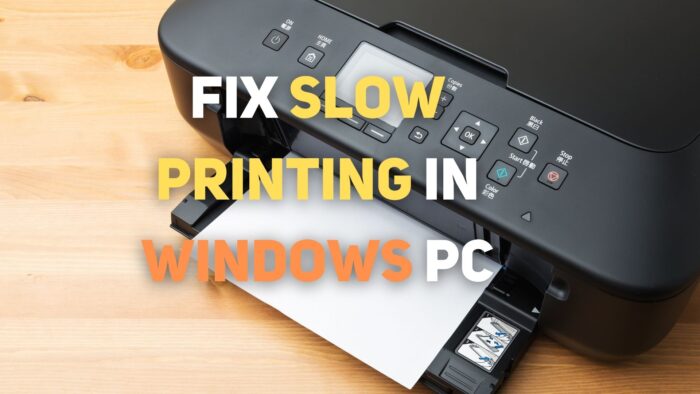
Why Do Printers Start Printing Slow?
While printing documents, we all sometimes report issues related to slow printing. There can be various reasons for slow printing, such as:
- If you are using a network printer, the slow printing problem could be the network, the print spooler, or printer drivers.
- Wired printers print faster as compared to wireless printers.
- An inefficient printer server can also cause slow printing.
Whatever is the reason, but it makes all of this so annoying and also reduces our workflow. Let us now go through some tips to solve this problem.
How To Fix Slow Printing In Windows PC?
Follow these steps to resolve the printer issues:
- Hard Reset Printer
- Printer Preferences
- Restart Printer Spooler Service
- Check Network Connection
- Update Printer Firmware
- Update Printer Driver
You will need admin permission and clear knowledge of using the computer on the technical front. Also, make sure to create a system restore or take backup.
1] Hard Reset Printer
When used for a long time, the printer often gets heated. To avoid overheating issues, printers often reduce the printing speed to reduce heat generation. So first, you should reset your printer by a simple restart. Follow these steps to restart your printer:
- Long press the Power button on the printer to turn it off.
- Disconnect the power cable.
- Wait for few minutes to completely drain off power from all-electric components of your printer.
- Then reconnect the power cable and turn on the printer
To check the speed of the printer, give some test print command. Check if your printer has started working properly now, else try other methods.
2] Printer Preferences
Printer preferences are one of the causes of slow printing issues. Hence it can be fixed by changing the print speed and print quality settings. The printout quality is inversely proportional to the print speed of the printer. So the print quality decreases with a faster printing speed. You need to change the print quality settings from best to normal or draft for quick printouts.
Note: This is a tradeoff. It is possible that the current setting of the Printer output quality is high, and hence printer takes a longer time. Usually, it’s not the default setting, but someone may have changed it.
Check the following steps to make changes in your printer speed settings:
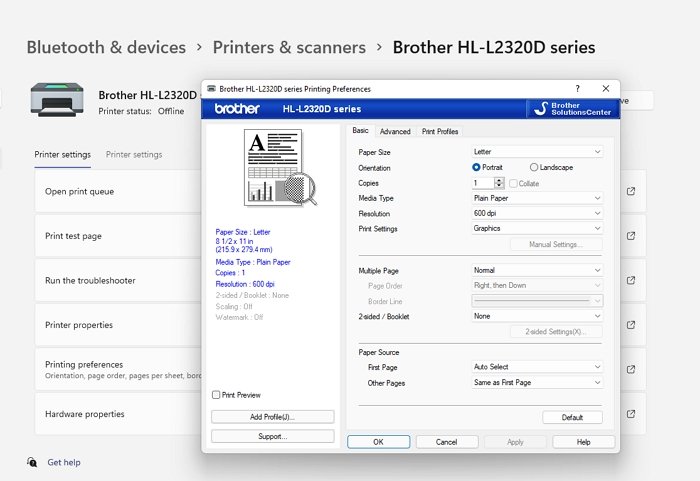
- Open the search box using Windows + S and search for the Printer.
- Click to open the Printers & Scanners when it appears in the list
- Select the printer which is working slow, and then click on Printing Preferences.
- In the Printing Preferences window, change or lower the quality to default, or if you need, set the quality further lower to increase the speed. Change resolution, toner setting, and others.
- Click on Apply and OK.
If you do not want colored printouts, choose Black & White. Now take a test to check the speed of the printer. Post this; the speed should improve but can impact the overall quality.
3] Restart Printer Spooler Service
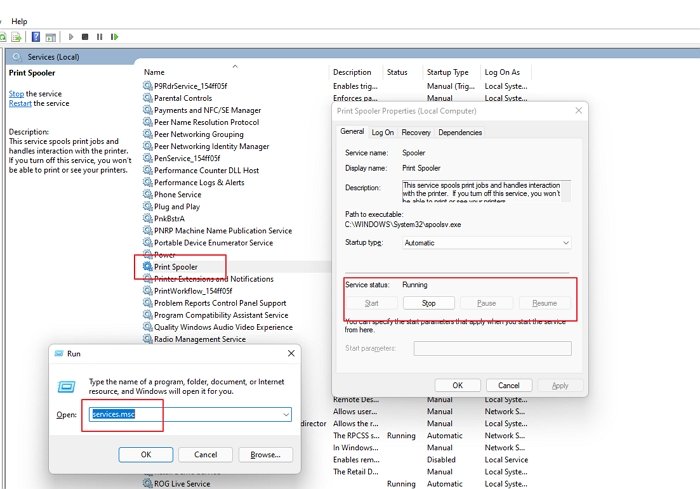
The Printer Spooler is used to create a queue of all that has to be printed. Sometimes when there are many print commands, the printer spooler gets clogged. Because of too much data, it slows the response of the printer. In such cases, all you need to do is restart the printer spooler service. Follow the steps to do so:
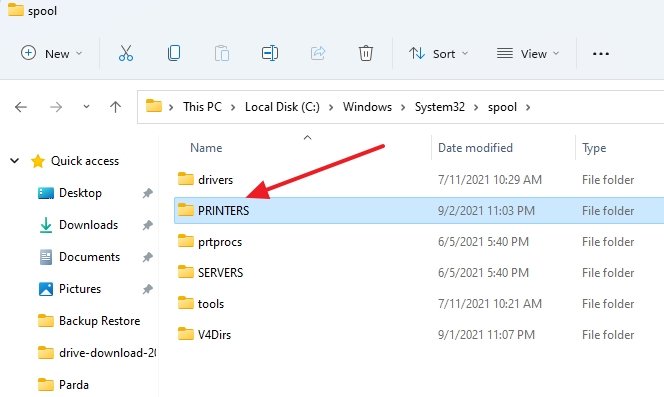
- Open the RUN box using Windows + R.
- Type Services.msc and click the OK button.
- Now locate the Printer Spooler and right-click to open the context menu.
- Then click Stop and minimize the window.
- Again open the RUN box and type Spool. Press Enter.
- It will open the System32\spool folder. Double click to open the PRINTERS folder.
- Here you will find a print queue. Delete all the pending files present in this folder.
- Then go to the Services window again and right-click the Print Spooler. Click Start.
- Now give a new Print command to check the printer’s speed.
4] Check Network Connection
For network printers, the slow printing problem may be because of network issues. If you are using a network connection, it is advisable to reboot it at least once every 24 hours. In the case of wired printers, make sure that the ethernet cable is in place. For wireless printers, reboot your router and close all the unwanted bandwidth draining applications to increase the printer’s speed.
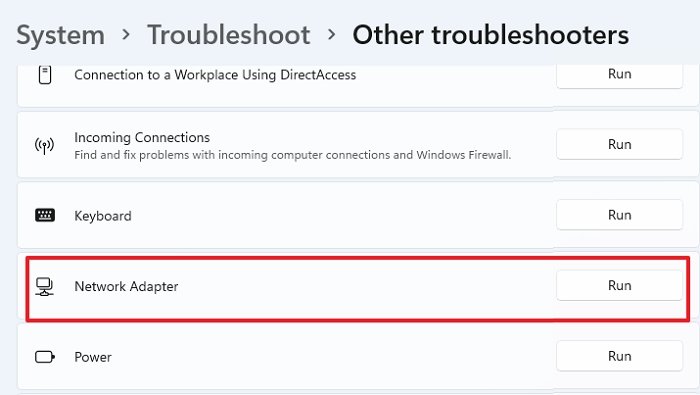
Alternatively, you can run the Network Troubleshooter wizard available under Settings > System > Troubleshoot > Other troubleshooters > Network Adapter.
Recheck your network connection and print. If the issue still exists, try the next method.
5] Update Printer Firmware
To resolve the slow printing issues of your printer, make sure that the firmware of your printer is updated. For the wireless printers, you may get the manufacturer’s push notifications from time to time for updates. In the case of wired printers, you need to download and install the firmware updates from the official website of the printer manufacturer.
Make sure to install the Printer Software from the OEM website. It will be able to notify you about the new firmware and help you install it.
6] Update Printer Drivers
The next method to fix the slow printing problem in Windows PC is to update the printer drivers. It needs to be done manually by downloading the relevant file from the OEM website. To manually update the printer driver, follow these steps:
- Use Win + X to open Power Menu and then select Device Manager.
- Go to the Printers and expand it.
- Locate your printer, right-click and select Update Driver
- Click on Search automatically for drivers
- On the next screen, you need to click on Search for updated drivers on Windows Update.
- It will open Windows Update, where you go and check if a printer driver is available under Optional Updates.
Make sure to restart the PC in case of a new driver installation. You can also use third-party tools for automatic updates of outdated drivers.
How Do I Change Printer Settings In Windows?
- Go to Start, select Settings, and then go to Printers & Faxes.
- Right-click on Printer and select Properties.
- Then go to the Advanced tab.
- Click on Printing Defaults.
- Here you can change the settings.
How Do I Fix A Print Queue Issue?
While you can stop the Print Spooler service and then delete all the files at C:\Windows\System32\spool\PRINTERS to clear the print queue, you can use an alternate solution.
Go to System > Troubleshoot > Other troubleshooters and run the Printer troubleshooter.
Why Is Printer Slowly Printing The PDF Files?
The reasons for the slow printing of the PDF files include large PDF Files, high-quality image size included in the file, and the excessive number of pages. All these increase the time of printing even at normal speed. Make sure to check how you can optimize the print by changing speed, lowering the quality of the output, and so on.
We hope that the suggested method will help you to fix slow printing issues on Windows PC. Let us know in the comment section below which method worked for you successfully. Now your printer’s printing speed must improve. But if you are still facing issues, contact your printer manufacturer for further assistance.
Leave a Reply